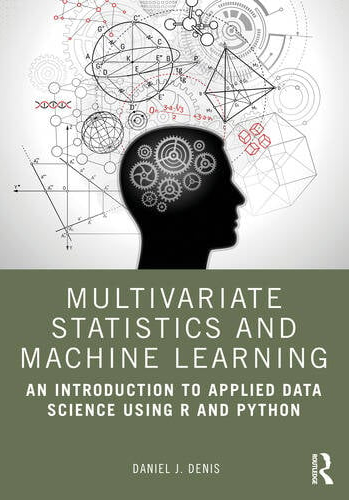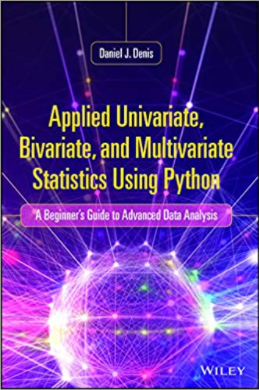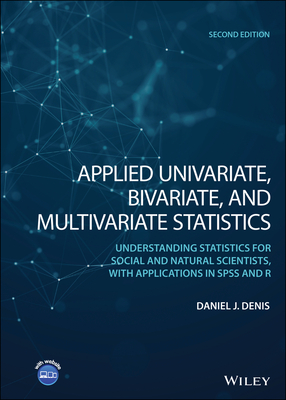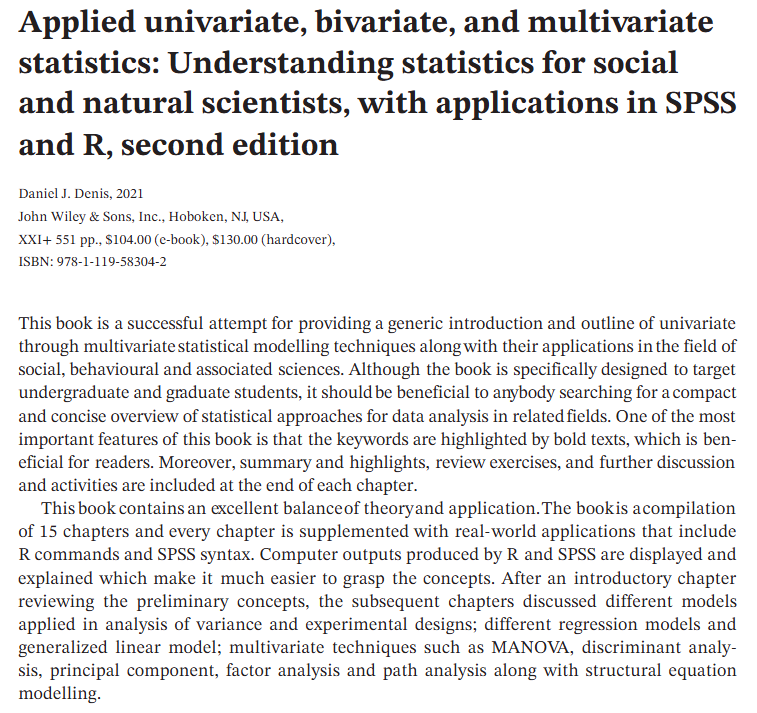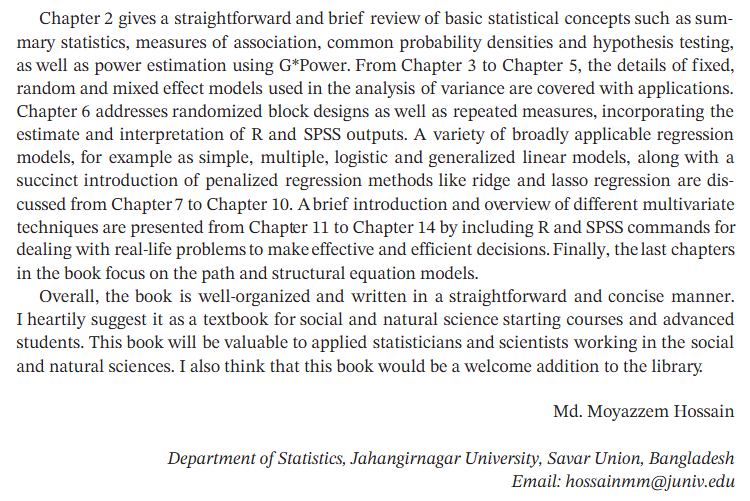|


About the
Author
Daniel
J. Denis, Ph.D has served as
Professor of
Quantitative Psychology
at the University of
Montana since 2004 where
he has taught numerous
courses in advanced
statistics to students
in the social and
natural sciences. He has
also served as reviewer
for journals such as Psychological
Methods, BMC
Medicine, International
Statistical Review,
Journal of Modern and
Applied Statistical
Methods,
European Journal of
Research Methods in
Behavioral and Social
Sciences, and Statistical
Science of the
Institute of
Mathematical
Statistics, among
others. He has consulted
in a variety of fields
such as legal, medical,
and social science more
generally and has served
as Expert Witness to the
District Court of the
United States. His teaching
philosophy is to help
and challenge students
to think on their own
so that they become
independent, critical
consumers and
producers of knowledge
rather than blindly
following the status
quo. Good science is
about challenging the
status quo, not
blindly submitting to
it or uncritically
trusting authority.
The purpose of
education should be to
learn how to think
analytically,
critically and
ethically, not simply
memorize and
regurgitate material
found in textbooks or
a professor's lecture
notes. Scientific
advancement requires
scientists to take
substantive risks
which requires
evaluating risky
hypotheses, not
conforming to the
status quo.
Dr. Denis'
research
interests,
both academic
and
professional,
include the
dissemination
and teaching
of applied
behavioral
statistics and
experimental
design through
the use of
analytical,
practical,
philosophical,
and historical
insights, emphasizing
foundations
and how these
tools should
be effectively
and ethically
used in the
evaluation of
scientific
findings.
His goal is
to help
students see
through the
verbiage and
marketing of
quantitative
methods to
learn what is
really there
underlying the
"glitter".
What is
machine
learning? How
exactly does a
machine
"learn"? What
is really
going on at a
more
foundational
technical
level?
Expertise in
an area
implies seeing
through the
presumed
complexity of
what is
advertised and
marketed to
get to the
simple
ingredients
and concepts
that make the
methodology
"tick" and are
at their very
foundation;
cut through
the
smokescreen
and see what's
really going
on behind the
fancy words.
Advanced
procedures are
often
misunderstood
due to a lack
of
understanding
and
appreciation
for such
foundations.
If you are a
prospective
student
interested in
working with
Dr. Denis in
the
Experimental
Psychology
Program at the
University of
Montana, or
would like to
receive
educational
mentorship
outside of
academia,
please contact
him directly
at daniel.denis@umontana.edu
or via his faculty
page at
the University
of Montana.
Book
Publishing
& Recent
Directions
 For
the better
part of the
last 10
years (since
2012 when I
received my
first book
contract with
Wiley), I have
been authoring
books on
applied
statistics for
the social and
natural
sciences
featuring R,
SPSS, and
Python
software. The
most
significant
and thorough
of these
projects
is Applied
Univariate,
Bivariate, and
Multivariate
Statistics:
Understanding
Statistics for
the Social and
Natural
Sciences with
Applications
in SPSS and R,
now in its 2nd
edition (2021,
Wiley) and
more recently
Multivariate
Statistics and
Machine
Learning: An
Introduction
to Applied
Data Science
Using R and
Python
published in
2026
(Routledge).
These books
combine a mix
of theory and
application,
but also
philosophical,
historical,
and ethical
context (i.e.,
products of my
own research
and thinking
of these
issues)
regarding the
various
methodologies
surveyed to
help the user
know what can
vs. cannot be
concluded
scientifically
from the
application of
a given
technique in
conjunction
with
experimental
vs.
non-experimental
design and
other
scientific
concerns. The
other three
books (on R,
SPSS, and
Python) are
smaller
introductory
beginner books
on applied
statistics
that feature
the chosen
software in
data-analytic
demonstrations.
I am also
published with
Robert J.
Sternberg (of
"Sternberg's
IQ") &
Wade Pickren
in The Cambridge Handbook of the Intellectual History of
Psychology. The
chapter was
one on the
history of
methodology
and statistics
in psychology,
and was
co-authored
with my
graduate
student at the
time, Briana
Young, Ph.D. For
the better
part of the
last 10
years (since
2012 when I
received my
first book
contract with
Wiley), I have
been authoring
books on
applied
statistics for
the social and
natural
sciences
featuring R,
SPSS, and
Python
software. The
most
significant
and thorough
of these
projects
is Applied
Univariate,
Bivariate, and
Multivariate
Statistics:
Understanding
Statistics for
the Social and
Natural
Sciences with
Applications
in SPSS and R,
now in its 2nd
edition (2021,
Wiley) and
more recently
Multivariate
Statistics and
Machine
Learning: An
Introduction
to Applied
Data Science
Using R and
Python
published in
2026
(Routledge).
These books
combine a mix
of theory and
application,
but also
philosophical,
historical,
and ethical
context (i.e.,
products of my
own research
and thinking
of these
issues)
regarding the
various
methodologies
surveyed to
help the user
know what can
vs. cannot be
concluded
scientifically
from the
application of
a given
technique in
conjunction
with
experimental
vs.
non-experimental
design and
other
scientific
concerns. The
other three
books (on R,
SPSS, and
Python) are
smaller
introductory
beginner books
on applied
statistics
that feature
the chosen
software in
data-analytic
demonstrations.
I am also
published with
Robert J.
Sternberg (of
"Sternberg's
IQ") &
Wade Pickren
in The Cambridge Handbook of the Intellectual History of
Psychology. The
chapter was
one on the
history of
methodology
and statistics
in psychology,
and was
co-authored
with my
graduate
student at the
time, Briana
Young, Ph.D.
The historical
evolution of
statistical progress
occurs in the
context of a
wider
zeitgeist, and
conceptual
seedlings
predate
rigorous
definition by
sometimes
thousands of
years. This
has been well
established by
historians of
statistics and
science.
Understanding
how
quantitative
methods
evolved as a
way of mapping
the "real
world" or
whether they
evolved
independent of
practical
considerations
is an interest
of mine, as
well as what
can vs. cannot
be ethically
concluded from
a scientific
investigation
that employs
such
quantitative
tools. Too
often,
scientists
overestimate
the power of
the analytical
tool in
supporting
their
scientific
hypotheses. In
my teaching, I
aim to help
students
understand and
appreciate
just what can
vs. cannot be
concluded from
the use of
statistics in
a research or
scientific
context. In
this sense, my
teaching
encourages
students to
think independently and critically when
confronted
with science
that uses
statistics,
and to look at
the "Big
Picture" when
interpreting a
research
article.
Assumptions,
methodology,
design,
statistics,
psychometric
properties of
tests, these
are all
factors that
need to be
considered to
arrive at the
"bottom line"
of what a
research
report is
communicating,
which does not
always
coincide with
what authors
would like you
to take away
from the
research.
Critically
evaluating
research does
not imply
being
"negative," or
"pessimistic,"
it simply
means trying
to accurately
assess what
can vs. cannot
be ethically
gleamed from a
research
finding.
Design, not
statistical
analysis, is
usually what
is most
important in
establishing a
scientific
finding. Complex
statistical
analyses on an
unstable
design
foundation is
analogous to
building a
house on
quicksand. The
house may
be impressive,
but the entire
structure will
fail
inspection.
Books
by Daniel J.
Denis, Ph.D.

 2020
2020 |
 R
BOOK_DATA_(ZIP) R
BOOK_DATA_(ZIP)
"Reading
the book feels like an experience of
attending a live workshop from an
experienced academician explaining it in
a simple language. The book is well
suited for teaching senior undergraduate
or fresh graduate students in statistics
and allied subjects of the modern era.
The topics from this book can supplement
the teaching of courses in statistics as
an excellent application-oriented
deliverable material. The community of
statisticians, applied workers, workshop
trainers and students will undoubtedly
find this book appealing and beneficial.
The author must be complimented for the
thoughtful creation of this book." - Reviewed
by the Royal Statistical Society |

|
Editorial Reviews
Review
'The famous statement that
psychology has a long past but a short
history reflects the fact that empirical
psychology is a relatively new arrival
among the sciences, but that the
fascination with psychological topics
has been around for thousands of years.
This volume by Robert J. Sternberg and
Wade E. Pickren successfully melds the
discipline's past and history. Readers
get a seamless path from philosophy to
natural philosophy to scientific
psychology across its many
sub-disciplines. Unlike standard
histories of psychology, this book shows
the breadth of psychology as it has
evolved to its present state.' Barney
Beins, Ithaca College, New York
'By assembling an impressive group of
specialist scholars, Robert J. Sternberg
and Wade E. Pickren have created a
volume of great value for both students
and researchers. These lucid historical
overviews provide an excellent
introduction to the history of the major
research areas of modern psychology.'
Andrew S. Winston, University of Guelph,
Canada
'The Cambridge Handbook of the
Intellectual History of Psychology
reveals the rich tapestry of
personalities, ideas, theories,
controversies, and empirical findings
that have contributed to our
contemporary understanding of
psychology. It is an engaging, highly
accessible, and erudite resource that
every teacher and student of psychology
needs to read.' Dannette Marie,
University of Aberdeen
'With chapters from leading experts in
the sub-disciplines or active
researchers in the history of
psychology, both students and
professionals now have access to a
valuable bank of information concerning
the historical evolution of specific
sub-disciplines' ideas as a way to
address the declining knowledge of
disciplinary history.' Ingrid Farreras,
Hood College, Maryland
'The 19 chapters of this multi-author
volume cover the intellectual history of
various sub-disciplines and concerns of
psychology. Each chapter is written by a
specialist in the given field ... Many
chapters will be engaging for those
particularly interested in the history
of psychology, and the book could well
be valued by students and scholars of
that history.' K. S. Milar, Choice
Book Description
This Handbook presents the
intellectual history and surrounding
context of theories and research across
a range of psychological domains. The
book is topically organized, much like
an introductory-psychology text, so
readers can discover the intellectual
history of the particular fields of
psychology that interest them.
About the Author
Robert
J. Sternberg is Professor of Human
Development at Cornell University, New
York and Honorary Professor of Psychology
at the Ruprecht-Karls-Universitšt
Heidelberg, Germany. He has also won the
William James Award and the James McKeen
Cattell Award from Association for
Political Science (APS) and the Grawemeyer
Award in Psychology. He is past-president
of the American Psychological Association.
Wade E. Pickren is Director of the Center
for Faculty Excellence at Ithaca College,
New York. He was the founding director of
the American Psychological Association
(APA) Archives and served as its first
historian. He also served as editor of
History of Psychology from 2010 to 15 |
|


 For
the better
part of the
last 10
years (since
2012 when I
received my
first book
contract with
Wiley), I have
been authoring
books on
applied
statistics for
the social and
natural
sciences
featuring R,
SPSS, and
Python
software. The
most
significant
and thorough
of these
projects
is
For
the better
part of the
last 10
years (since
2012 when I
received my
first book
contract with
Wiley), I have
been authoring
books on
applied
statistics for
the social and
natural
sciences
featuring R,
SPSS, and
Python
software. The
most
significant
and thorough
of these
projects
is 


